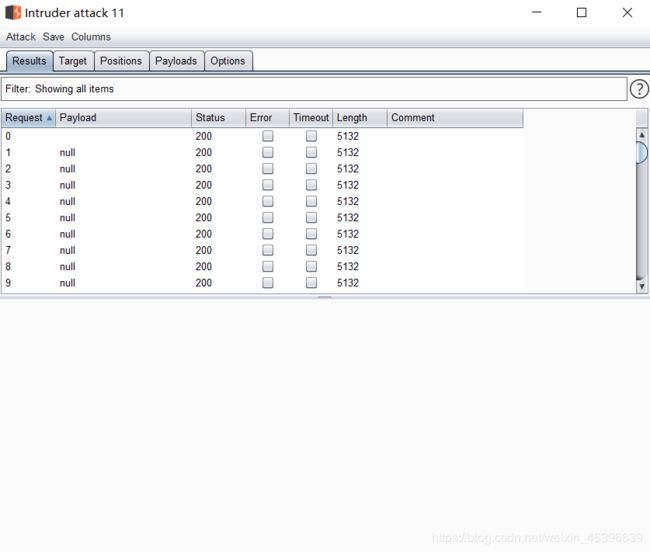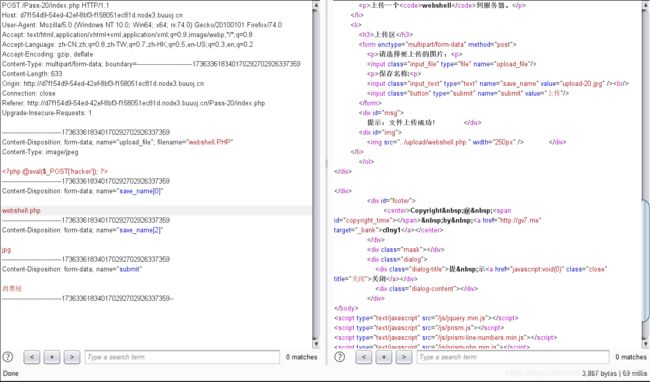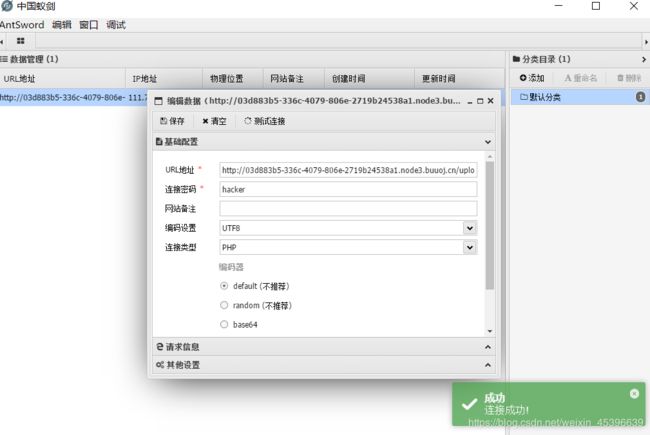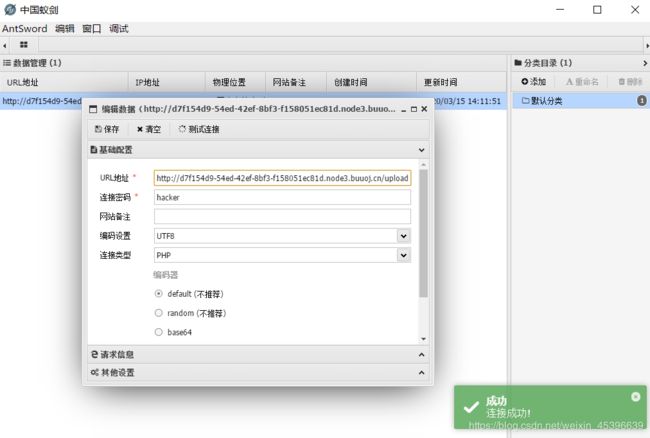upload-labs第16-20关
upload-labs第十六关(二次渲染)
只做了gif上传。。。
$is_upload = false;
$msg = null;
if (isset($_POST['submit'])){
// 获得上传文件的基本信息,文件名,类型,大小,临时文件路径
$filename = $_FILES['upload_file']['name'];
$filetype = $_FILES['upload_file']['type'];
$tmpname = $_FILES['upload_file']['tmp_name'];
$target_path=UPLOAD_PATH.'/'.basename($filename);
// 获得上传文件的扩展名
$fileext= substr(strrchr($filename,"."),1);
//判断文件后缀与类型,合法才进行上传操作
if(($fileext == "jpg") && ($filetype=="image/jpeg")){
if(move_uploaded_file($tmpname,$target_path)){
//使用上传的图片生成新的图片
$im = imagecreatefromjpeg($target_path);
if($im == false){
$msg = "该文件不是jpg格式的图片!";
@unlink($target_path);
}else{
//给新图片指定文件名
srand(time());
$newfilename = strval(rand()).".jpg";
//显示二次渲染后的图片(使用用户上传图片生成的新图片)
$img_path = UPLOAD_PATH.'/'.$newfilename;
imagejpeg($im,$img_path);
@unlink($target_path);
$is_upload = true;
}
} else {
$msg = "上传出错!";
}
}else if(($fileext == "png") && ($filetype=="image/png")){
if(move_uploaded_file($tmpname,$target_path)){
//使用上传的图片生成新的图片
$im = imagecreatefrompng($target_path);
if($im == false){
$msg = "该文件不是png格式的图片!";
@unlink($target_path);
}else{
//给新图片指定文件名
srand(time());
$newfilename = strval(rand()).".png";
//显示二次渲染后的图片(使用用户上传图片生成的新图片)
$img_path = UPLOAD_PATH.'/'.$newfilename;
imagepng($im,$img_path);
@unlink($target_path);
$is_upload = true;
}
} else {
$msg = "上传出错!";
}
}else if(($fileext == "gif") && ($filetype=="image/gif")){
if(move_uploaded_file($tmpname,$target_path)){
//使用上传的图片生成新的图片
$im = imagecreatefromgif($target_path);
if($im == false){
$msg = "该文件不是gif格式的图片!";
@unlink($target_path);
}else{
//给新图片指定文件名
srand(time());
$newfilename = strval(rand()).".gif";
//显示二次渲染后的图片(使用用户上传图片生成的新图片)
$img_path = UPLOAD_PATH.'/'.$newfilename;
imagegif($im,$img_path);
@unlink($target_path);
$is_upload = true;
}
} else {
$msg = "上传出错!";
}
}else{
$msg = "只允许上传后缀为.jpg|.png|.gif的图片文件!";
}
}
代码用imagecreatefromgif(),imagecreatefromjpeg(),imagecreatefrompng()函数重构图片,避免文件包含漏洞。
就行图片上传的时候,我发现了一个问题:
首先上传一张gif图片(gif_1),保存经函数重构后的图片(gif_2),将gif_2再次上传,保存gif_2重构后的图片(gif_3),发现gif_2,gif_3二进制数据没有任何变化。这个时候你只需要在gif_2或gif_3中插入php代码,然后上传就行。
这样就不用比较两个文件的相同和不同之处了
upload-labs第十七关(条件竞争)
$is_upload = false;
$msg = null;
if(isset($_POST['submit'])){
$ext_arr = array('jpg','png','gif');
$file_name = $_FILES['upload_file']['name'];
$temp_file = $_FILES['upload_file']['tmp_name'];
$file_ext = substr($file_name,strrpos($file_name,".")+1);
$upload_file = UPLOAD_PATH . '/' . $file_name;
if(move_uploaded_file($temp_file, $upload_file)){
if(in_array($file_ext,$ext_arr)){
$img_path = UPLOAD_PATH . '/'. rand(10, 99).date("YmdHis").".".$file_ext;
rename($upload_file, $img_path);
$is_upload = true;
}else{
$msg = "只允许上传.jpg|.png|.gif类型文件!";
unlink($upload_file);
}
}else{
$msg = '上传出错!';
}
}
代码先保存文件再判断文件类型,如果用burp不断发包,再在浏览器不断访问,就可能访问到上传的文件,这次改一下上传的代码
 代码只要被访问到,就会在目录下生成一个php文件,内容是一句话木马,等会可以用蚁剑连接
代码只要被访问到,就会在目录下生成一个php文件,内容是一句话木马,等会可以用蚁剑连接

burp不断发包,浏览器不断访问,直到发现访问成功,然后用蚁剑连

upload-labs第十八关(条件竞争)
//index.php
$is_upload = false;
$msg = null;
if (isset($_POST['submit']))
{
require_once("./myupload.php");
$imgFileName =time();
$u = new MyUpload($_FILES['upload_file']['name'], $_FILES['upload_file']['tmp_name'], $_FILES['upload_file']['size'],$imgFileName);
$status_code = $u->upload(UPLOAD_PATH);
switch ($status_code) {
case 1:
$is_upload = true;
$img_path = $u->cls_upload_dir . $u->cls_file_rename_to;
break;
case 2:
$msg = '文件已经被上传,但没有重命名。';
break;
case -1:
$msg = '这个文件不能上传到服务器的临时文件存储目录。';
break;
case -2:
$msg = '上传失败,上传目录不可写。';
break;
case -3:
$msg = '上传失败,无法上传该类型文件。';
break;
case -4:
$msg = '上传失败,上传的文件过大。';
break;
case -5:
$msg = '上传失败,服务器已经存在相同名称文件。';
break;
case -6:
$msg = '文件无法上传,文件不能复制到目标目录。';
break;
default:
$msg = '未知错误!';
break;
}
}
//myupload.php
class MyUpload{
......
......
......
var $cls_arr_ext_accepted = array(
".doc", ".xls", ".txt", ".pdf", ".gif", ".jpg", ".zip", ".rar", ".7z",".ppt",
".html", ".xml", ".tiff", ".jpeg", ".png" );
......
......
......
/** upload()
**
** Method to upload the file.
** This is the only method to call outside the class.
** @para String name of directory we upload to
** @returns void
**/
function upload( $dir ){
$ret = $this->isUploadedFile();
if( $ret != 1 ){
return $this->resultUpload( $ret );
}
$ret = $this->setDir( $dir );
if( $ret != 1 ){
return $this->resultUpload( $ret );
}
$ret = $this->checkExtension();
if( $ret != 1 ){
return $this->resultUpload( $ret );
}
$ret = $this->checkSize();
if( $ret != 1 ){
return $this->resultUpload( $ret );
}
// if flag to check if the file exists is set to 1
if( $this->cls_file_exists == 1 ){
$ret = $this->checkFileExists();
if( $ret != 1 ){
return $this->resultUpload( $ret );
}
}
// if we are here, we are ready to move the file to destination
$ret = $this->move();
if( $ret != 1 ){
return $this->resultUpload( $ret );
}
// check if we need to rename the file
if( $this->cls_rename_file == 1 ){
$ret = $this->renameFile();
if( $ret != 1 ){
return $this->resultUpload( $ret );
}
}
// if we are here, everything worked as planned :)
return $this->resultUpload( "SUCCESS" );
}
......
......
......
};
代码可以看出,代码先检查后缀,然后上传文件,然后更改文件名。这里又有条件竞争,在文件改名之前访问到它就行(配合文件解析漏洞)
我去看了看checkExtension()函数的代码

checkExtension()函数检查最后一个点之后的文件名,也就是后缀,存在文件解析漏洞
思路:上传web.php.7z,不断访问,和上一关一样
upload-labs第十九关(文件解析漏洞)
if (isset($_POST['submit'])) {
if (file_exists(UPLOAD_PATH)) {
$deny_ext = array("php","php5","php4","php3","php2","html","htm","phtml","pht","jsp","jspa","jspx","jsw","jsv","jspf","jtml","asp","aspx","asa","asax","ascx","ashx","asmx","cer","swf","htaccess");
$file_name = $_POST['save_name'];
$file_ext = pathinfo($file_name,PATHINFO_EXTENSION);
if(!in_array($file_ext,$deny_ext)) {
$temp_file = $_FILES['upload_file']['tmp_name'];
$img_path = UPLOAD_PATH . '/' .$file_name;
if (move_uploaded_file($temp_file, $img_path)) {
$is_upload = true;
}else{
$msg = '上传出错!';
}
}else{
$msg = '禁止保存为该类型文件!';
}
} else {
$msg = UPLOAD_PATH . '文件夹不存在,请手工创建!';
}
}
upload-labs(数组绕过)
$is_upload = false;
$msg = null;
if(!empty($_FILES['upload_file'])){
//检查MIME
$allow_type = array('image/jpeg','image/png','image/gif');
if(!in_array($_FILES['upload_file']['type'],$allow_type)){
$msg = "禁止上传该类型文件!";
}else{
//检查文件名
$file = empty($_POST['save_name']) ? $_FILES['upload_file']['name'] : $_POST['save_name'];
if (!is_array($file)) {
$file = explode('.', strtolower($file));
}
$ext = end($file);
$allow_suffix = array('jpg','png','gif');
if (!in_array($ext, $allow_suffix)) {
$msg = "禁止上传该后缀文件!";
}else{
$file_name = reset($file) . '.' . $file[count($file) - 1];
$temp_file = $_FILES['upload_file']['tmp_name'];
$img_path = UPLOAD_PATH . '/' .$file_name;
if (move_uploaded_file($temp_file, $img_path)) {
$msg = "文件上传成功!";
$is_upload = true;
} else {
$msg = "文件上传失败!";
}
}
}
}else{
$msg = "请选择要上传的文件!";
}
代码里有个扯淡的地方
if (!is_array($file)) {
$file = explode('.', strtolower($file));
}
如果$file是数组,就不会执行这段代码
那么传数组就行
 为什么是pass[2]呢?因为
为什么是pass[2]呢?因为
$file_name = reset($file) . '.' . $file[count($file) - 1];
count($file) = 2,
count($file) - 1 = 1,
$file[1]是空,
所以实际上file_name = reset($file) + ‘.’



